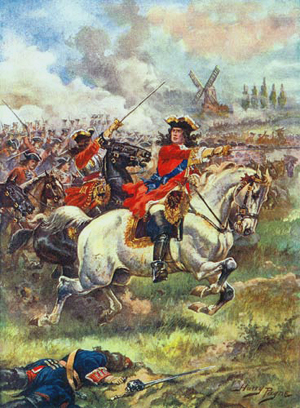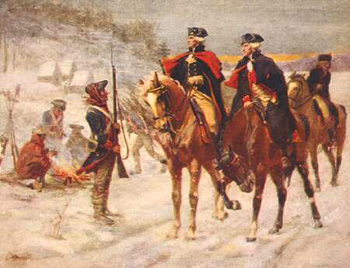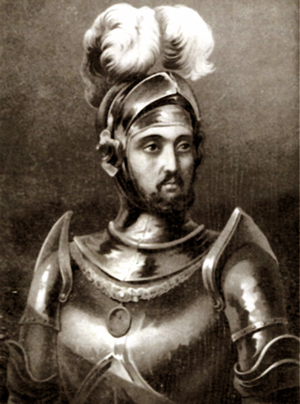 |
Organic Society
Leadership Is Established by Generosity & Gratitude, Not a Social Contract
Plinio Corrêa de Oliveira
The modern idea that the right to command depends only upon the consent of those commanded contains something of the errors found in the Social Contract of Jean Jacques Rousseau.
To investigate this let us ask ourselves: What is an authentic leadership? A group of persons agrees to accept the leadership of a man and to confer power on him because they recognize that this leadership is for the good of all. So, they grant leadership to that man and agree to obey him.
Today, in our revolutionary world, one only thinks about advantages. From this perspective comes the idea that the delegation and acceptance of power is an exchange of advantages: “I allow you to command me so long as you can satisfy my personal interests.” This is essentially the view of Rousseau in The Social Contract. It is an erroneous visualization of power.

John Churchill leads the English army in Battle of Blenheim. He became Duke of Marlborough |
Actually, the one who accepts the power assumes extra responsibilities and obligations, which demand many sacrifices and renunciations he would not have if he were only taking care of his private affairs. Thus, when a group of people chooses a leader, they implicitly tell him: “We are asking you to sacrifice yourself for all of us.”
The leader accepts, and becomes the one in that group who makes the greatest sacrifices in order to improve life for the others; he becomes the benefactor of the ensemble. This generosity of the leader creates a certain tone in the relations between him and his followers which is the relation between the benefactor and the beneficiaries. The leader gives his blood for the ensemble; the ensemble expresses its gratitude to him through obedience and respect. In its essence, this is not an exchange of interests, but an interchange of noble moral attitudes.
After this relation between one man and a group has functioned organically and harmonically for some time, the descendents of that first group accept the leadership of the leader’s son. They have an obligation of gratitude toward him as well. The normal debt of gratitude that comes from the benefits they received from the present day leader is thus added to a gratitude that came from the benefits their fathers received from their first leader.
It is normal that gratitude should be hereditary. Let us look, for example, at a man who saves the life of another man. He throws himself into a lake to save another man who does not know how to swim. Let us suppose that the lake is filled with poisonous snakes and other dangers. Risking his own life, the first man manages to drag the other to shore; but during this heroic act, he is bitten by a snake, which leaves him blind. He risked his life to save the other. The debt of gratitude of the beneficiary obliges him to help support his rescuer, and protect him and his family.
Further, if the blind man had not saved him, he could not have married and had a large family. Therefore, it is normal that the beneficiary’s children should also honor and help the rescuer and his children. The moral duty of gratitude, depending on each case, may be carried on for many generations.

Layfayette, right, with Washington during the War of Independence |
This is what happened with the famous John Churchill, first Duke of Marlborough. The English Monarchy made an alliance with the Austrian Empire to contain the expansionism of the French King Louis XIV, whose actions constituted a serious threat to both crowns. Marlborough was the great English General who, together with Prince Eugene of Savoy, the Austrian General, saved both countries from that danger. To express England’s gratitude to him, the English Monarch gave him lands, a considerable sum of money and the hereditary title of Duke. It was a way to pay England’s debt of gratitude for his action. Without him England would have suffered huge political losses.
God gave Marlborough military talent, courage and the capacity to command, gifts he exercised to save the country. This made his lineage worthy of the gratitude and admiration of his whole country forever. We see that the Social Contract of Rousseau contributes nothing to the establishment of this kind of leadership. Its theoretical argument is absent when dealing with the historical reality.
Another example of this kind of gratitude can be seen in the treatment the United States - now a Republic - gave to the Marquis of Lafayette and his lineage. All the descendents of Lafayette, the French military officer who fought for U.S. independence, enjoy the privilege of American citizenship, regardless of their country of birth.

The son of Columbus, Diego, 1st Duke of Veragua, was Viceroy and Governor of the New World |
The three Americas have a similar debt of gratitude to Christopher Columbus and his descendents, the Dukes of Veraguas in Spain. During the Civil War of Spain in 1936, the Communists took the then Duke of Veraguas prisoner. They were preparing to send him before the firing squad. Meanwhile, many of the American nations united to make a petition asking the Communist commanders not to execute the Duke of Veraguas, so that the descendents of the discoverer of America would not vanish from the face of the earth.
The Communists paid heed to the appeal and released the Duke of Veraguas. It is a beautiful episode that attests to the enduring gratitude of a large group of nations that were, with the exception of Canada, all Republics.
Thus, this notion of gratitude as an essential element of power is not just a medieval conception. Even among the revolutionaries, when they forget about the false Republican mythology born from Rousseau, what surfaces is a general acceptance of this truth: good sense surfaces.
One inherits the rights and the debts of gratitude, just as one inherits any other good. If it is right for a man to inherit goods of his father because he is flesh of his flesh and blood of his blood, then the gratitude of the father falls also to his son. For the same reason that property is hereditary, gratitude is hereditary and tribute is hereditary.
Therefore, this gratitude that is a fruit of good leadership may also be a source of it. This moral obligation of the descendants of beneficiaries is an important factor in conferring authority to the descendants of the benefactors.
So, to the leader’s moral abnegation and willingness to sacrifice himself as the base of organic authority should be added the debt of gratitude of the descendants of his subordinates. Both ideas show how legitimate, normal and organic it is for those who excel in serving the common good to be recognized as leaders of a group or a nation.

Posted April 14, 2008

  | | Prof. Plinio |
Organic Society was a theme dear to the late Prof. Plinio Corrêa de Oliveira. He addressed this topic on countless occasions during his life - at times in lectures for the formation of his disciples, at times in meetings with friends who gathered to study the social aspects and history of Christendom, at times just in passing.
Atila S. Guimarães selected excerpts of these lectures and conversations from the trancripts of tapes and his own personal notes. He translated and adapted them into articles for the TIA website. In these texts fidelity to the original ideas and words is kept as much as possible.

Related Topics of Interest
 The Clan and the Family The Clan and the Family
 Clans and Human Types Clans and Human Types
 Vocations of the European Peoples Vocations of the European Peoples
 The King of Spain Dishonors the Golden Fleece Order The King of Spain Dishonors the Golden Fleece Order
 Papal Knighthood Given to a Jewish Rabbi Papal Knighthood Given to a Jewish Rabbi
 Revolution and Counter-Revolution in the Tendencies, Ideas, and Facts Revolution and Counter-Revolution in the Tendencies, Ideas, and Facts

|
Organic Society | Social-Political | Home | Books | CDs | Search | Contact Us

© 2002-
Tradition in Action, Inc. All Rights Reserved
|
 |
|